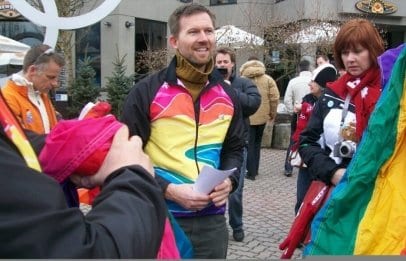
I’m embarrassed to admit that history was made in my backyard and I missed it.
I remember the opening of the world’s first Pride House, its Vancouver pavilion two blocks from my office on Davie Street. I remember the cheers from the gathered crowd, the mock hockey fight that ended symbolically in a hug, and the welcome speeches, especially from 1968 Olympic bronze medallist Marion Lay who talked about the many athletes still stuck in the closet.
I remember the feeling among many of the organizers that we were witnessing history in the making. But I think I must have lacked imagination that day, as I failed to grasp the impact that first Pride House and its successors would have on the sports world and beyond in the years to come.
I admitted as much to Dean Nelson a few weeks ago, when we met for lunch to talk about his latest addition to the Pride House legacy, whose seed was planted in 2008 with a vision he had for the 2010 Winter Olympics in Whistler and Vancouver.
“I had a little vision of ‘I’m going to throw a little party for my gay friends and we’re going to have a great time,’” he says with a smile, as his “little party” obviously turned into something a little bigger.
Nelson was already a gay fixture in Whistler on the eve of the Olympics, having rescued the ski resort’s ailing gay ski week from imminent collapse in 2006. As Whistler prepared to welcome the world’s athletes, Nelson thought about the space he’d like to create, the conversations he’d like to start.
Growing up gay, Nelson says he felt unsafe in the locker room and unwelcome on sports teams. Pride House, he says, was envisioned to celebrate LGBT athletes on and off the field, to support them competing as their authentic selves so they could turn in their best performances without wasting so much energy suppressing their sexuality.

(Top: Dean Nelson opens the first Pride House at the Whistler Olympics in 2010./Molly Blaisdell photo. Above: Pride House in Whistler.)
But Pride House was for more than the athletes. It was for the fans, too — fans who equally yearned to be their authentic selves, even in a sports setting.
“Part of the Olympic magic is being able to just enjoy that moment when your favourite team scores,” Nelson says. “If you were in a straight bar, you would edit yourself. But when you have your own space with like-minded people, you’re free to be your authentic self and express yourself.”
Pride House’s impact on the sports world might have been limited to the Whistler Olympics had Nelson and his associates not strategically placed themselves in the international spotlight.
“We were the breaking story of the 2010 Olympics,” Nelson says. Mainstream media from around the world seized on the story and for the first time began to consider the challenges faced by LGBT athletes. The You Can Play campaign driven by the Burke family would open more doors for professional athletes in hockey and other major North American leagues two years later, but in 2010 Pride House publicly started the conversation.
One press conference held by the Whistler Pride House team to object to homophobic commentating in the figure skating competition reached an estimated 156 countries, Nelson says.
The impact of Pride House extended to the Olympic establishment itself.
Four years after the launch of Pride House and many lobbying meetings later, the International Olympic Committee (IOC) announced in November 2014 that it would amend its Games charter to explicitly prohibit discrimination on the basis of sexual orientation. This followed an announcement just months earlier that it would also add anti-discrimination requirements to its host-city contracts. (Though the IOC did little to protest Russia’s anti-gay laws or support freedom of expression at the Sochi Olympics last February.)
Nevertheless Nelson believes, and I agree, that the IOC has shifted course as a result of the discussions begun and emboldened by Pride House.
Now a new Pride House is underway for Vancouver, this time to coincide with the last 10 days of the FIFA Women’s World Cup matches here, June 26–July 5.
Nelson hopes to house it in Jenn Mickey’s newly renovated, yet-to-be-renamed venue on Bute Street at Davie (formerly Heaven’s Door), in the heart of the gay village.
Like its predecessor at the 2010 Olympics — and its successors at the London 2012 Olympics, the 2012 European football championship, and the 2014 FIFA Men’s World Cup in Brazil — Nelson hopes the FIFA Women’s Pride House will create a celebratory space where our community and visitors from around the world can cheer on their favourite teams and express themselves freely together.
Maybe this time I’ll catch history in the making.
Robin Perelle is the managing editor of Daily Xtra in Vancouver. Reach her at robin.perelle@dailyxtra.com or @RobinPerelle on Twitter.

 Why you can trust Xtra
Why you can trust Xtra


